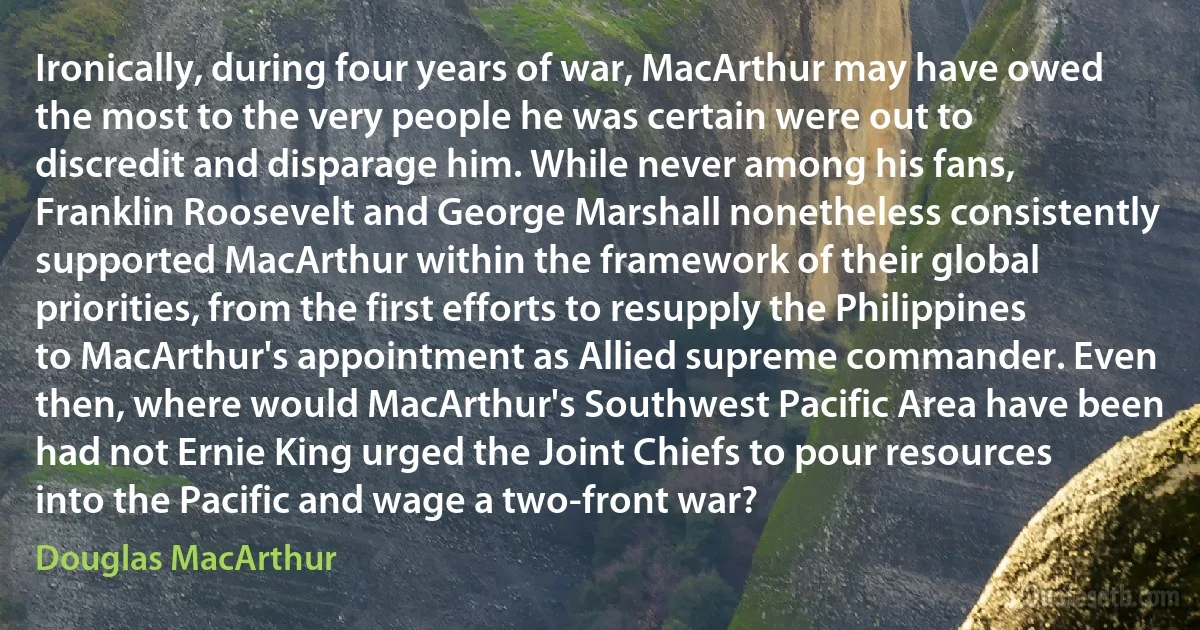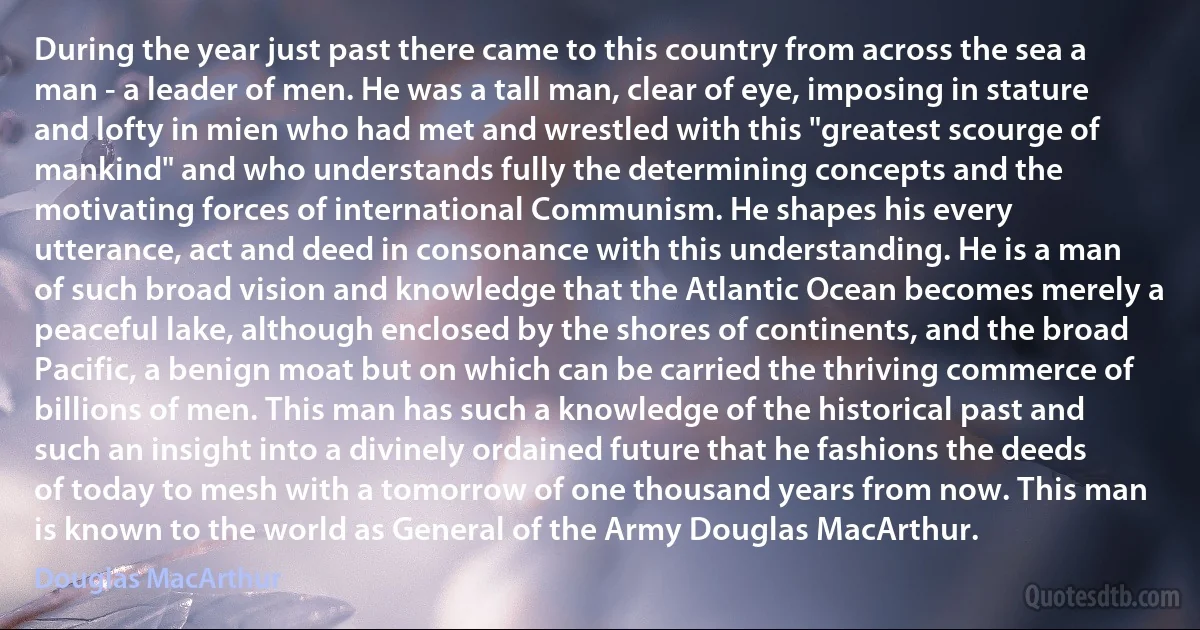Macarthur Quotes
She's telling us how to fight ISIS. Just go to her website. She tells you how to fight ISIS on her website. I don't think General Douglas MacArthur would like that too much. ... See, you're telling the enemy everything you want to do. No wonder you've been fighting ISIS your entire adult life.

Donald Trump
He wanted to win so badly it killed him. But before it killed him, it elevated the game of baseball, at the Polo Grounds, to a grim spectacle of play-war. The analogy fits McGraw. He reminds you more of a battlefield general than he does a sportsman, and if he reminds you of a general, it would be a man who combined the fury of a Patton and the spectacular, yet knowledgeable, flair of MacArthur. Perhaps this desire to win occasionally overflowed its normal limits and became an obsession; perhaps the grimness darkened the sport at times. This was his weakness, for McGraw was not infallible; McGraw was not perfect. Perfection is lifeless, mechanical, uncaring. McGraw was never uncaring. If he was anything, he was a man who cared.

Arnold Hano
Truman fired the popular Gen. Douglas MacArthur because he disobeyed orders in the Korean War. Johnson knew that he had reached the endgame in Vietnam when Gen. William Westmoreland, the top commander in Vietnam, requested 240,000 more troops in 1968 for the prolonged war that also could not be won.

Helen Thomas
Leahy had no part in the decision to relieve MacArthur, which came as a considerable shock to him, for he had known and liked the brilliant general for over fifty years, even though he had deplored his theatrical ways. He never questioned the president's authority and he felt he was not sufficiently informed to make a judgment on the question of MacArthur's relief. He wrote, somewhat mildly that the "detachment of MacArthur will stimulate aggressive political opposition by the Republican member of Congress."

Douglas MacArthur
Corregidor surrendered last night. Poor Wainwright! He did the fighting... [MacArthur] got such glory as the public could find... MacArthur's tirades, to which TJ and I so often listened to in Manila, would now sound as silly to the public as they then did to us. But he's a hero! Yah.

Douglas MacArthur
During the Korean War, MacArthur was a law unto himself, in matters both big and small. He quarreled defiantly in public with President Truman, agitating for nuclear war. In their eventual confrontation on Wake Island, MacArthur went so far as to arrive first and then order the president's approaching plane into a holding pattern. MacArthur's commander in chief would thus arrive on the landing strip appearing to be MacArthur's supplicant. In explaining why he subsequently relieved MacArthur of his command, Truman said, "I fired him because he wouldn't respect the authority of the president. I didn't fire him because he was a dumb son of a bitch, although he was, but that's not against the law for generals." Truman was arguably pulling his punches. He could have easily called MacArthur an asshole.

Douglas MacArthur
It was disturbing to see that General Westmoreland kept asking for additional troops without any clear objective. During the Korean War, Douglas MacArthur requested permission to cross the Yalu River to invade Manchuria. He was fired. General Westmoreland kept asking for new troops and didn't know what to do with them. He was later promoted to Army Chief of Staff. This was the sign of the times. It was unfortunate that we did not have generals in Viet Nam of MacArthur's caliber who knew what the objectives were and how to achieve them.

Douglas MacArthur
Many years before Harry Truman fired General Douglas MacArthur, there was another prima donna general, the renowned John C. Frémont. For issuing orders authorizing the emancipation of slaves in Missouri without presidential permission, Lincoln fired him on the spot. As for MacArthur, he should have known better: the same thing had also happened to his own father. Back in the early 1900s, General Arthur MacArthur, military governor of the Philippines, made the stupid mistake of not recognizing the superior authority of the civilian governor, William Howard Taft, who later became president. Years later, when MacArthur's turn came to be promoted to Army Chief of Staff, Taft blackballed him.

Douglas MacArthur
MacArthur always knew he was at the center of the world stage, and he had no intention of allowing the Philippines to fall without a struggle of legendary proportions. The very real difficulties he faced were daunting enough, and it is doubtful that he or any other American general could have saved the islands, but his own and others' errors put his forces at grave risk from the very first day of war.

Douglas MacArthur
The President of the United States of America, authorized by Act of Congress, July 9, 1918, takes pleasure in presenting the Distinguished Service Cross to Brigadier General (Corps of Engineers) Douglas MacArthur (ASN: 0-57), United States Army, for extraordinary heroism in action while serving as Chief of Staff, 42d Division, A.E.F., in the Salient-du-Feys, France, 9 March 1918. When Company D, 168th Infantry, was under severe attack in the salient du Feys, France, General MacArthur voluntarily joined it, upon finding that he could do so without interfering with his normal duties, and by his coolness and conspicuous courage aided materially in its success.

Douglas MacArthur
The U.S. Navy hated MacArthur, really hated him. Early in the Pacific War it began agitating for an overall command in the area, the idea being to get MacArthur and his troops under its control. Believing Marshall to share their antipathy, the Navy enlisted his support and was delighted when he appeared to give it. "But on one condition," he said. "If we're going to have an overall commander in the Pacific, there isn't any question about it, you will have to pick MacArthur- on the basis of pure competence alone." The Navy abruptly abandoned the idea. Later, when the Navy wished to bypass the liberation of the Philippines in favor of operations against Formosa, it was Marshall who again intervened to insist MacArthur be allowed to fulfill his pledge to the Philippine people, to whom he had vowed, "I shall return." He was given the go-ahead to do so, and, of course, was hailed as the greatest hero of the Pacific war.

Douglas MacArthur
With his flamboyant headgear, his sunglasses and corn cob pipe, he looked like an actor playing the role of a great general. He also had the sort of press an actor likes; he arranged that, in part, by keeping his subordinates as anonymous as possible. But the truth was that Douglas MacArthur, Supreme Commander of Allied Forces in the Southwest Pacific, was a great general. He had one of the most distinguished military careers on record (top of his class at West Point, a hero in the first war, Army Chief of Staff), and it is doubtful that anyone in any of the services knew more about the Pacific theater. Nonetheless, the war that would be waged to return him to the Philippines, as he had promised, would be a Navy war, and [three admirals] - Nimitz, King, and Halsey - would have every bit as much to do with the strategy and tactics of winning that war as he had.

Douglas MacArthur
Many years before Harry Truman fired General Douglas MacArthur, there was another prima donna general, the renowned John C. Frémont. For issuing orders authorizing the emancipation of slaves in Missouri without presidential permission, Lincoln fired him on the spot. As for MacArthur, he should have known better: the same thing had also happened to his own father. Back in the early 1900s, General Arthur MacArthur, military governor of the Philippines, made the stupid mistake of not recognizing the superior authority of the civilian governor, William Howard Taft, who later became president. Years later, when MacArthur's turn came to be promoted to Army Chief of Staff, Taft blackballed him.

William Howard Taft



